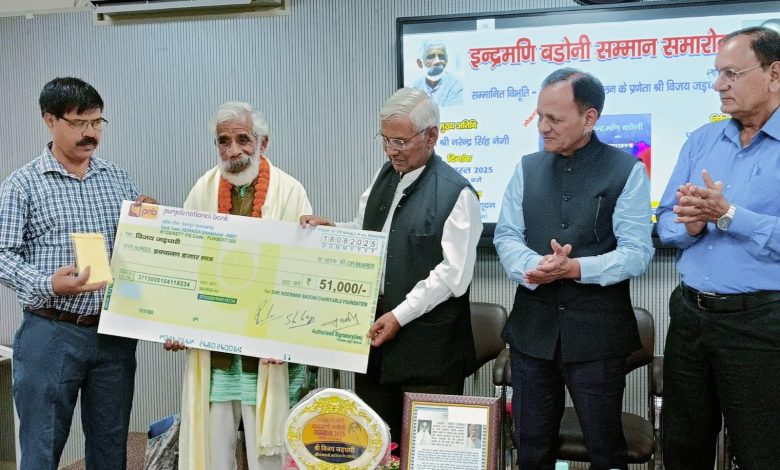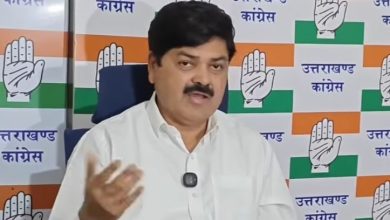Legendary nature activist and Beej Bachao Andolan leader Vijay Jardari receives prestigious late Indramani Baduni Smriti Samman and Rs 51000 cash prize in Dehradun

SHEESHPAL GUSAIN , EMINENT WRITER
The legendary social activist and leader of Save the Seeds movement of Uttarakhand who has to his credit several prestigious awards for his life long contribution in the field of preserving and protecting the seeds of various species of corps and plants Vijay Jardari was today felicitated with prestigious late Indramani Badooni Memorial Honour af the hands of legendary Uttarakhandi singer , lyricist and poet Narendra Singh Negi in a glittering function at Dehradun on the ocassion of the death anniversary of the iconic personality and founder of the Uttarakhand separate state movement Indramani Badooni.
Today, when Vijay Jrdhari was honoured with the Late Indramani Badoni Smriti Samman, it is not just an honour for an individual, but a salutation to the entire ideology of traditional agriculture, inheritance of seeds and nature conservation.
In the year 1974 Vijay Jardari’s father opened a shop of books and stationery for survival. However, destiny offered him a big goal.
In the same year Vijay Jardari joined the long Askot Arakot Yatra with eminent environmentalist Sunderlal Bahuguna and other enlightened colleagues.
This journey on foot wasn’t just a Padyayra but an occasion to become enlightened towards environment protection and love for nature.
Meanwhile, the call for prohibition of liquor, women’s awakening, Chipko movement and Gram Swaraj shook Jardhari from inside and as a result he left the shop and dedicated his life to social service, natural farming and various social movements.
From 1977 to 1980, Vijay Jrdhari played an active role in the Chipko movement in forests like Adoni, Badiyargarh, Lassi, Dhungmandar and Khuret.
When he and Kunwar Prasun, activist and writer/ journalist were alone trying to save trees in the Badiyargarh forest, the forest mafia not only threatened them but also tied them to the trees.
Despite being hungry and thirsty, he remained firm on his commitment. The most horrific incident happened on 10 January 1979, when Jrdhari ji was clinging to a tree. The Forest Corporation officer along with the workers used a saw to terrorize him and even tried to cut Jardhari’s leg.
His pyjamas were torn, the saw’s teeth pierced his knees and he suffered immense pain – but he did not let the tree be cut.
On 9 February 1978, he was arrested along with 23 companions and had to spend 14 days in jail. This struggle was not just to save the forest, but was a resolution to save the soul of the Himalayas wrote eminent writer and Umesh Dobhal award recipient Sheeshpal Gusain.
After the Chipko movement, Jardhari’s attention turned to the biggest threat that was determined to dry up the veins of the Himalayas—limestone mining. He opened fronts in Hevalghati, Nagni, Khadi-Jajal and Puttdi.
In Nagni he was attacked by the mining mafia. His fight was decisive in getting the mines of Nahikalan (Doon Valley) and Kataldi village closed.
The Kataldi mine was closed only in the year 2012 after a battle that lasted for two decades—the credit for which goes to Jaddhari’s struggle.
In the 1980s, the ill-effects of the Green Revolution began to surface. Chemical fertilizers, hybrid seeds from outside and dependence on the market enslaved the farmers. Jardhari started the Beej Bachao Andolan (BBA) during this period.
This movement was not based on any institutional structure or funds, but was a mass movement based on the consciousness of the farmers. He revived the “Barhanaja” system—a traditional mixed farming system in which 12 cereals and pulses are grown in one field.
This method is not just farming, but a shield of food sovereignty and biodiversity. Today his collection has hundreds of varieties of paddy, jhangora, mandua, ghat, bhatt, oilseeds, spices and pulses.
The most important thing is that these seeds are not sold, they are distributed – because the nature of the seed is to germinate, spread and give life to everyone.
Indira Gandhi Environment Award (2009), Kirloskar Vasundhara Samman (2024), now Indramani Badoni Smriti Samman (2025) all these awards are not only a testimony to the personal contribution of Vijay Jardhari, but it is also a collective victory for farmers and activists who are still fighting to protect traditional seeds and the environment.
The authors of the book “Indramani Badoni and Uttarakhand” are two eminent personalities—Girish Badoni and Anil Singh Negi.
Girish Badoni, a teacher in the hilly region, is a protector of culture and folk heritage in addition to education at the same time, Anil Singh Negi is currently working as A.R.T.O. in Vikasnagar.







